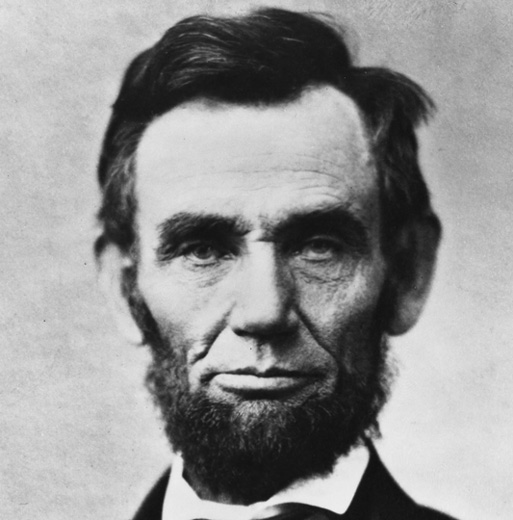|
Moderated by NW Okie! |
Volume 12 , Issue 152010Weekly eZine: (374 subscribers)Subscribe | Unsubscribe Using Desktop... |
Radical Republicans & Abe Lincoln

Was Abraham Lincoln a radical republican? -- The radicals frequently concluded that Lincoln was a prisoner of the conservative wing of the party, whereas conservatives complained that Lincoln was too close to the Radicals. But Lincoln's cautious reserve had the dual benefit of leaving open his lines of communication with both wings of the party and fragmenting his opposition.
1832 Lincoln ran unsuccessfully for the Illinois legislature. Two years later he was elected to the lower house for the first of four successive terms (until 1841) as a Whig. His membership in the Whig Party was natural -- Lincoln's father was a Whig, and the party's ambitious program of national economic development was the perfect solution to the problems Lincoln had seen in his rural Indiana past.
Abraham Lincoln started out as a Whig then progressed to the Republican Pary in 1856. By 1864 Lincoln was running on the National Union Party ticket for re-election as United States President.
Between the years of 1847-1849, Lincoln served one term as a member of the U.S. House of Representatives, where he opposed the Mexican War as unnecessary and unconstitutional. That was one of the reasons that Abraham Lincoln split with the Whigs.
Lincoln had been indifferent about the annexation of Texas, but he opposed any expansion that would allow slavery into new areas. Lincoln supported the Wilmot Proviso, which would have barred slavery from any territory gained as a result of the Mexican War.
Lincoln did not run for Congress again, returning instead to Springfield Illinois and the law. It was not until 1855 that Lincoln returned to politics when he vied for the U.S. Senate, but eventually threw his support to Lyman Trumbull.
The Republican Party
The Republican Party was founded by anti-slavery expansion activists in 1854. The Republican Party at its formation during the 1850s was a coalition of Northern altruists, industrialists, former Whigs, practical politicians, etc. While not publicly committed to abolition of slavery prior to the Civil War, the party nonetheless attracted the most zealous anti-slavery advocates.
It was in 1856 Lincoln joined the newly formed Republican Party, and two years later he campaigned for the Senate against Stephen Douglas. In his speech at Springfield in acceptance of the Republican senatorial nomination (June 16, 1858) Lincoln suggested that Douglas, Chief Justice Roger B. Taney, and Democratic presidents Franklin Pierce and James Buchanan had conspired to nationalize slavery. He did not win the Senate seat.
In February 1860, Lincoln made his first major political appearance in the Northeast when he addressed a rally at the Cooper Union in New York. He went on to win the presidential election, defeating the Northern Democrat Douglas, the Southern Democrat John C. Breckinridge, and the Constitutional Union candidate John Bell. By the time of Lincoln's inauguration in March 1861, seven states had seceded from the Union. On April 12, 1861, South Carolina fired on the Fort Sumter, and the Civil War began.
Lincoln tried throughout the war to keep the Republican party (moderate and radicals) together and never consistently favored one faction in the party over another. At that time there were the Radical Republicans (Abolitionists) and the Moderate Republicans.
Lincoln's achievements, saving the Union and freeing the slaves, and his martyrdom just at the war's end assured his continuing fame. No small contribution was made by his eloquence as exemplified in the Gettysburg Address (November 19, 1863), in which he defined the war as "A rededication to the egalitarian ideals of the Declaration of Independence."
Lincoln left the Republican Party in 1864 to campaign as the National Union Party presidential candidate, and then aggressively pursued the impeachment of the National Union Party successor and former southern Democrat Andrew Johnson.
President Lincoln's Second Inaugural Address, is now inscribed on one wall of the Lincoln Memorial in Washington, D. C. -- "With malice toward none; with charity for all; with firmness in the right, as God gives us to see the right, let us strive on to finish the work we are in; to bind up the nation's wounds
Lincoln warned the South in his Inaugural Address, "In your hands, my dissatisfied fellow countrymen, and not in mine, is the momentous issue of civil war. The government will not assail you.... You have no oath registered in Heaven to destroy the government, while I shall have the most solemn one to preserve, protect and defend it."
Lincoln decided that if ten percent (10%)of the voters in a Confederate state signed an oath of loyalty to the United States, that state would be readmitted to the Union. But, Lincoln's plans were met with some resistance. A group of congressmen, known as the Radical Republicans, wanted to punish the states that had seceded. Lincoln disagreed with the Radical Republicans' agenda and opposed their legislation. Then, in 1865, Lincoln was assassinated. His vice president, Andrew Johnson, became head of the country. The Radical Republicans thought the new president would be on their side, but President Andrew Johnson followed through on Lincoln's plans on reconstruction of America.
President Lincoln successfully led his country through its greatest internal crisis, the American Civil War (1860-1865), preserving the Union and ending slavery. Six days after the large-scale surrender of Confederate forces under General Robert E. Lee, Lincoln became the first American president to be assassinated.
| View or Add Comments (0 Comments)
| Receive
updates ( subscribers) |
Unsubscribe
| © . Linda Mcgill Wagner - began © 1999 Contact Me | |
